
to 2 feet, 3 inches

100 pounds


The Dogue de Bordeaux, also known as the French Mastiff, has history that goes back several centuries. This is an ancient dog breed that was bred from Roman Mastiffs. This breed is one of France’s oldest dog breeds, and was originally considered to be one of three types of dog breeds: the Bordeaux, Paris, and Toulouse.
Brief History
The Dogue de Bordeaux is part of the UKC, Guardian Dog Group, and the AKC, Working Dog Group. For many centuries the “Bordeaux Mastiff” or the “Mastiff Bulldog” were two different sizes. The smaller sized breed was called the Doguin, and vanished from historical records after the 1700’s. The larger sized breed is what we know today as the Dogue de Bordeaux.
Dogues were originally used as fighting dogs. These dogs were used to hunt, guard, and draft. By the end of the 1700’s they were used as guard dogs on properties belonging to nobility. This ended with the French Revolution. The Dogue were then used to guard livestock, and they were nicknamed the “Butcher’s Dog.” The breed came close to extinction after WW1. During the 1960’s and 1970’s this breed became popular again. Today this breed is used for both companionship and guarding. The Dogue de Bordeaux was first imported to the U.S in the 1980’s.
Physical Description
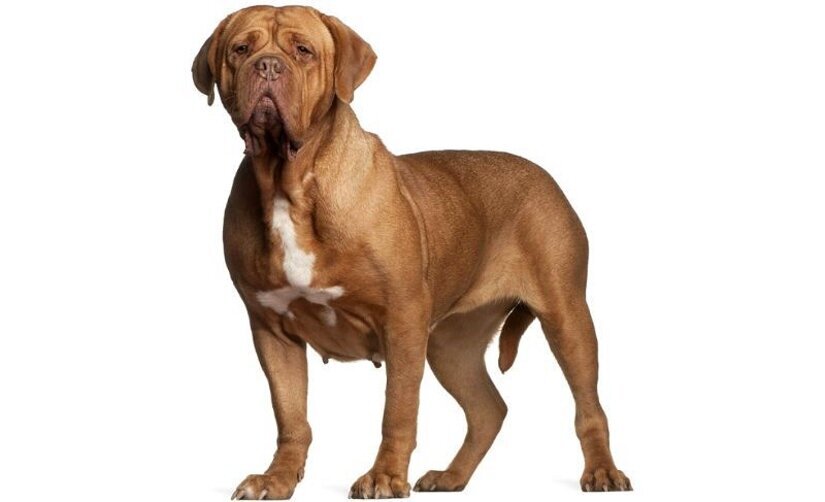
The Dogue de Bordeaux is a massive dog breed, that is both powerful and heavily boned. It is tall, and broad. The Dogue has a harmonious outline. It is built close to the ground. This breed is both stocky and athletic in build. With a massive head that is broad, the Dogue has a short muzzle and undershot jaw. The expression is serious.
The intelligent brown eyes are large, and the ears are small, drop ears. The forehead has lots of wrinkles. The tail is long and tapering. The coat is smooth and short. The coat color can be any shade of fawn, ranging from mahogany to Isabella. This breed has a black or self-colored mask. This dog breed is typical of a brachycephalic molossoid dog breed. It is capable of fast speed over short distances.
Temperament
The Dogue de Bordeaux is an affectionate dog breed. This dog breed makes for an excellent companion and guard dog. That said, this dog breed is not aggressive, and has lots of courage and vigilance. The Dogue is even tempered with a high stimulus threshold. This dog breed can be dog aggressive. It is good with children if well socialized, and positively trained from puppyhood. Males can be more domineering. This breed does best with a large garden or farm. It is not an apartment dog.
Special Needs
The Dogue de Bordeaux needs plenty of socialization and positive training from puppyhood. This dog breed does best with daily exercise combined with mental stimulation. It is not a dog breed that can be left at home alone all day. The Dogue needs to have an active family that is dog experienced. Despite the Dogue being a massive dog breed, this dog breed makes for an excellent and outgoing dog breed, that is both companion and guard dog. The Dogue is outgoing and friendly, but thrives with positive dog training, and socialization. These dogs need firm and consistent positive dog training and socialization that is ongoing throughout their lives.
Possible Health Concerns
The Dogue de Bordeaux is an active and healthy dog breed that may be susceptible to the following health conditions:
- Bloat: This breed is deep-chested, and thus more prone to bloat. Bloat is a life threatening emergency. It is caused by the twisting of the stomach, together with the accumulation of gas, with or without fluid. It is best to never elevate your Dogue’s water and food bowls. Stress is also a major factor in causing bloat. Avoid feeding a large meal, followed by vigorous exercise. At the first signs of dry vomiting, restlessness and discomfort, contact your emergency veterinarian. Don’t wait for a few hours. This is a true emergency that is life-threatening!
- Aortic Stenosis: This is an inherited condition where there is a narrowing on one of the valves of the heart that controls blood flow from the left ventricle of the heart to the aorta. Affected dogs will have difficulty exercising, breathing difficulties, coughing, and fatigue. Consult with your veterinarian for advice.
- Hip Dysplasia: This is a hereditary condition that affects Dogue’s. HD is an abnormal development of the hip joint in medium and large dog breeds like the Dogue de Bordeaux. It is generally characterized by a loose joint, and then degenerative joint disease. Dogs should be fed a high-quality diet that is geared towards their life stage. Puppies should only be fed high-quality puppy dog food. Excessive growth, types of exercise, nutritional factors, and hereditary factors all come in to play with hip dysplasia. Consult with your veterinarian for expert advice.
- Dilated Cardiomyopathy: This is an acquired disease that causes progressive loss of the heart muscle’s ability to contract. No symptoms are seen in the beginning. It is one of the most common acquired heart diseases seen in dogs, and is usually seen in middle aged dogs. More males are affected than females. Some symptoms are episodes of fainting, coughing, difficulty breathing and accumulation of fluid in chest or abdomen. Consult with your veterinarian for advice.
- Osteochrondosis: This is when there is a disturbance in the cartilage and bone formation of medium and large dogs that grow quickly. The immature joint cartilage separates from the underlying bone. Symptoms are lameness, fluid build-up within the joint, and joint stiffness, Treatment usually involves surgery. Recovery outlook is excellent. Consult with your veterinarian for advice.
Exercise
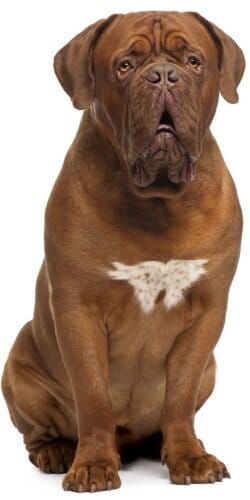
The Dogue De Bordeaux does well with moderate exercise. This breed is part of the working group. An energetic walk around the block or fun romps at the dog park will suffice. This breed enjoys dog training classes and swimming. The Dogue has moderate energy, and needs the mental stimulation provided by gentle canine sports. The Dogue may look large at six months, but it is still a puppy. Exercise needs to be in moderation, and not excessive to avoid joint and bone related problems as this breed matures.
As usual exercise should never be undertaken during hot or humid temperatures. All dog breeds need to be protected from extreme temperatures. The Dogue breed enjoys playing around with family members, loves Frisbee, and going to the dog beach.
That said, the Dogue de Bordeaux needs to only have a low impact exercise schedule until it reaches 18 months of age. This is to prevent damage to the joints and bones. They should also not be allowed to jump off tables, run up flights of stairs, or overexert themselves. Swimming is a great exercise for this massive dog breed that will promote bone and joint strength. Adult Dogue’s can pull carts, and enjoy some of the more active canine sports available.
Nutrition
A high-quality diet helps your Dogue de Bordeaux fight disease, grow correctly and age well. That said, with so many dog foods available, there are numerous healthy options. A high-quality dog food has the power to heal; yet that healing is totally dependent on the quality of the ingredients in each dog food recipe. Dog food recipes are also constantly changing, and it’s up to very dog parent to read the ingredient label carefully. It’s most important to feed this breed a puppy formula to prevent excessive growth, and joint problems later on in life. Elderly Dogue’s need to be on a senior dog food formula.
Here’s what to look for when choosing a high-quality dog food for your Dogue:
- Look for dog foods that are tested using the AAFCO feeding trials instead of by formulation.
- Look for the nutritional adequacy statement that is required on all pet food labels.
- This label provides answers to three most important questions about your pet food.
- If it’s complete and balanced
- What life stage is it intended for? (Puppy, senior)
- How the claims on the label are substantiated?
- Healthy ingredients
- Fresh meat
- Vegetables and fruit
- No controversial ingredients
- No added hormones and steroids
- No unnamed meat sources
- Right ratio of macronutrients
- By-products in dog food are fine when they are organ meats
- Dog food should not be overly processed
Grooming
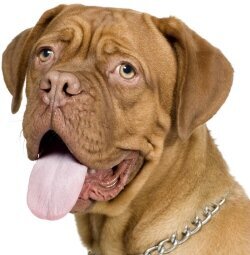
The Dogue de Bordeaux has a short coat that is easy to maintain. The main problem with this breed is that they drool a lot. That said, the facial wrinkles need to be cleaned every day to prevent debris building up, and infection setting in. Canine wipes make facial cleaning very easy. The short coat does shed minimally year round. By using a gentle rubber curry comb or shedding blade, dirt and old hairs can be removed quickly. Bathing should be weekly, or as needed if your Dogue has been rolling around in mud and dirt.
Teeth need to be brushed daily with a canine toothbrush and canine toothpaste. Ears cleaned weekly, and checked for sensitivity. Nails trimmed as needed. Your Dogue de Bordeaux will need to have a professional dental cleaning twice a year. Consult with your veterinarian for canine dental hygiene advice.
Adopting a Dogue de Bordeaux
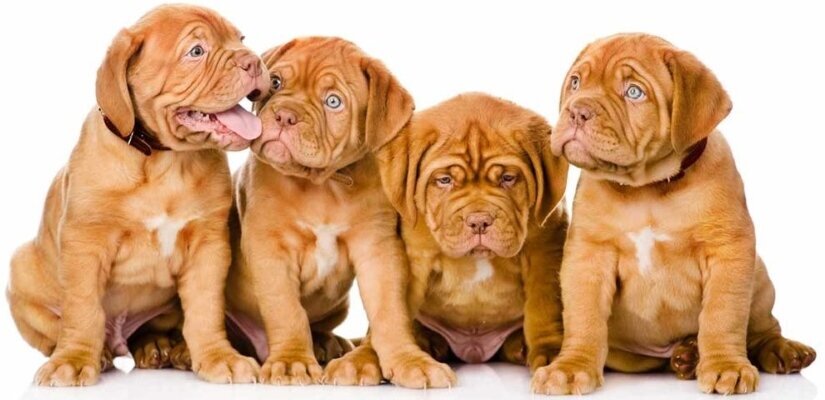
Breeds like the Dogue de Bordeaux are superb additions to any home, especially those with children. This very gentle and loyal dog breed needs to be loved and treated with affection. In fact, they just love being everywhere with you. That said, keep in mind that this breed drools a lot. So be prepared! Special canine wipes or a small cotton facial towel nearby always works best!
The Dogue do not do well being left alone all day. They form a very strong bond with their dog parent, and may have problems with other dogs or people, if not well socialized from puppyhood. A regular exercise schedule needs to begin right away, so that you can start bonding with your Dogue. Visit your veterinarian to have a full health check done on your Dogue.
Some normal behaviors may occur after adoption which may include digging holes, barking or perhaps being slightly depressed. Before adopting a Dogue, find out about his past. Take your dog’s past history into account when figuring out quirky behavioral issues. If any behavior becomes excessive, consult your veterinarian. Ask your shelter about free training follow–ups.
Give your Dogue time to adjust to his new surroundings. As with any dog adoption, make sure that you have the time and resources to take good care of your Dogue de Bordeaux!
Frequently Asked Questions
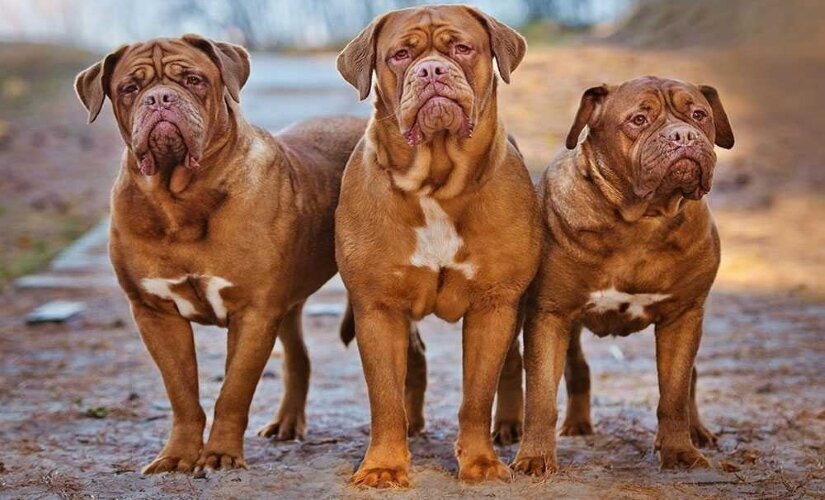
What is the Average Lifespan of the Dogue de Bordeaux?
This breed may live from 5 to 8 years. This is because congestive heart failure is a common problem and even affects younger dogs.
Does Dogue de Bordeaux Have Health Problems?
The Dogue de Bordeaux may be prone to bloat, Aortic stenosis, hip dysplasia, lymphoma, dilated cardiomyopathy, and other health conditions.
Do Dogue de Bordeaux Sleep a lot?
Yes. This breed enjoys sleeping a lot. The Dogue de Bordeaux is an affectionate and sensitive dog breed and makes for an excellent companion and guard dog.
How Much Does a Dogue de Bordeaux Cost?
Expect to spend from $3,000 to $7,000 plus or even more for a Dogue De Bordeaux with the best bloodlines. The average cost for all Dogue De Bordeaux sold is $900 to $2500.
Is a Dogue de Bordeaux a Good Family Pet?
Breeds like the Dogue de Bordeaux are wonderful additions to all homes, especially those with children. This very gentle dog breed enjoys family time and bonding with family members. As with all dog breeds, the takeaway from this breed is to socialize and positively train your pup as soon as you can.
Does the Dogue de Bordeaux Shed a Lot?
No. This breed sheds moderately. The Dogue de Bordeaux has a short coat that is easy to maintain. The main problem with this breed is that they drool a lot. That said, the facial wrinkles need to be cleaned every day to prevent debris building up and infection from setting in. Canine wipes make facial cleaning very easy. The short coat does shed minimally year-round. Using a gentle rubber curry comb or shedding blade, dirt and old hairs can be removed quickly. Bathing should be weekly or as needed if your Dogue has been rolling around in mud and dirt.
Who is the Oldest Dogue de Bordeaux?
The oldest Dogue de Bordeaux on record was 12 years old.
How Much Exercise Does a Healthy Dogue de Bordeaux Need?
The Dogue De Bordeaux does well with moderate exercise. This breed is part of the working group. An energetic walk around the block or fun romps at the dog park will suffice. This breed enjoys dog training classes and swimming. The Dogue has moderate energy and needs the mental stimulation provided by gentle canine sports. The Dogue may look large at six months, but it is still a puppy. Exercise needs to be in moderation and not excessive to avoid joint and bone-related problems as this breed matures.
Should I Adopt a Dogue de Bordeaux?
Breeds like the Dogue de Bordeaux are superb additions to any home, especially those with children. The Dogue do not do well being left alone all day. They form a strong bond with their dog parent and may have problems with other dogs or people if not well socialized from puppyhood. A regular exercise schedule needs to begin right away so that you can start bonding with your Dogue. Visit your veterinarian to have a full health check on your Dogue after adopting your Dogue de Bordeaux.
Best Dogue de Bordeaux Breeders in the USA (2021)
Heartstrings Dogue de Bordeaux
- Address
- Akron, OH 44303
- Website
- heartstringsdoguedebordeaux.com
- Phone
- (330) 322-4876
- Contact Form
Faithdriven Farm
- Address
- Rootstown, OH 44272
- Website
- www.fdfarm.com
- Phone
- (330) 221-1782
- debby@fdfarm.com
Premiere Roux Bordeaux
- Address
- Caulfield, MO 65626
- Website
- premiereroux.com
- Phone
- (417) 372-0345
- premiereroux@gmail.com
PuppyCreek Kennels
- Address
- Huntsville, AR 72740
- Website
- www.puppycreek.com
- Phone
- (479) 677-2476
- Contact Form
GingerHaus DDB
- Address
- Vine Grove, KY 40175
- Website
- www.gingerhausddb.com
- Phone
- (270) 312-7743
- GingerHausDDB@gmail.com
Lyon Hills Bordeaux
- Address
- South Lyon, MI 48178
- Website
- www.lyonhillsbordeaux.com
- Phone
- (248) 513-0361
- lyonhillsbordeaux@gmail.com
Blue Ridge, TX – Dogue De Bordeaux – French Mastiff
- Address
- Blue Ridge, TX 75424
- Website
- blueridgetxdoguedebordeaux.business.site
- Phone
- (469) 628-4775
- blueridge.tx.dogue.de.bordeaux@gmail.com
Toni Bloom
- Address
- Fowlerville, MI 48836
- Website
- bloomscounty.com
- Phone
- (517) 375-4015
- Bloomscounty@gmail.com
Legacy Bordeaux
- Address
- Clarksville, AR 72830
- Website
- legacybordeaux.com
- Phone
- (479) 774-2930
- christianthomas143@outlook.com
Almond Blossom Bordeaux
- Address
- Ripon, CA 95366
- Website
- almondblossombordeaux.com
- Phone
- (209) 595-9165
- Cheriaescobar@gmail.com
Foxwood K-9
- Address
- Shipshewana, IN 46565
- Website
- foxwoodk9.com
- Phone
- (812) 787-2385
- foxwoodpuppies@gmail.com
HOT DIGGITY DDB
- Address
- Andover, CT 06232
- Website
- diggitydogue.com
- Phone
- (860) 742-5333
- Dogue@prodigy.net
Top Breeders in the Canada
Redlegends Bordeaux
- Address
- Warkworth, ON
- Website
- redlegendsbordeaux.com
- redlegendsdogues@gmail.com
Vintage Bordeaux
- Address
- 519 David Manchester Road Carp (Ottawa), ON
- Phone
- 6138362421
